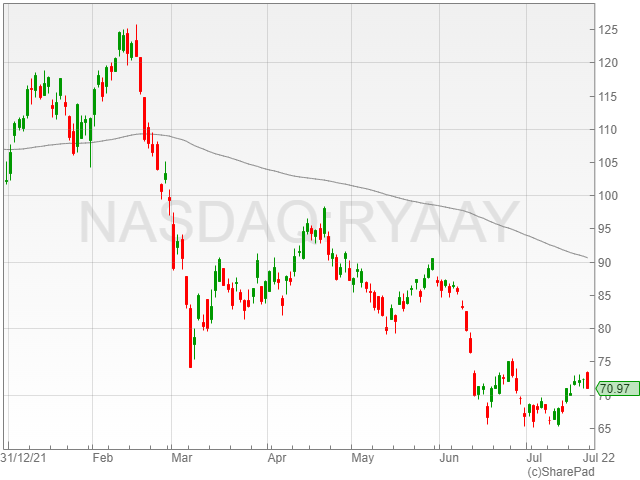Ryanair shares fell 1.8% to 70.9p in early morning trading on Monday after the budget airline reported a post-tax profit of €170 million in Q1 2023 against a Q1 2022 loss of €273 million, however its profit remained below its Q1 2020 pre-Covid profit of €243 million.
The travel firm announced a 602% surge in revenue to €2.6 billion compared to €370 million year-on-year, linked to its recovery in customer levels, which saw a 461% spike to 45.5 million from 8.1 million as Covid restrictions eased and travel recommenced.
“Ryanair is leading its peers in the recovery from COVID and plans to operate its summer 2022 at a capacity 15% higher than 2019 levels. Our experts estimate revenue for this summer could be 20% higher than in 2019,” said Third Bridge senior analyst Allegra Dawes.
However, Ryanair noted its Easter bookings and fares were badly hit by the Russian invasion of Ukraine in late February this year.

The company’s operating costs rose 253% to €680 million compared to €2.3 billion, and its fuel hedging for FY 2024 increased to 30% compared to 80% for FY 2023.
“The golden age of cheap air travel is over thanks to decade-high oil prices and inflation. However, Ryanair’s fuel hedging policy means they are better positioned to maintain price competitiveness and under less pressure to increase fares over the next 12 months,” said Dawes.
The travel group narrowed its net debt to €400 million from €1.4 billion on 31 March 2022, with a BBB credit rating according to S&P and Fitch. The company mentioned it aimed to reach zero net debt over the next two years.
Ryanair also highlighted the arrival of 73 new B737 ‘Gamechanger’ aircraft, which reportedly include a 4% rise in seats while burning 16% less fuel, with a noise emissions reduction of up to 40%. The travel firm said over 90% of its Gamechanger aircraft were unencumbered.
In terms of operational highlights, Ryanair mentioned the benefits of its decision to cut staff salaries in a move to reduce redundancies over the pandemic, following negotiations with employee unions.
The company have been fully crewed, despite operating at 115% of pre-Covid capacity, and the air firm added it was confident in its ability to operate almost 100% of its scheduled flights.
“The international travel recovery remains fragile due to a worldwide pilot shortage and the problem with labour strikes. However, our experts say that Ryanair has been more successful than others in coping with the crisis because it didn’t significantly reduce its workforce during the pandemic,” said Dawes.
Ryanair confirmed an earnings per share of 16.5 Euro cents against a loss of 24.1 Euro cents the last year.
